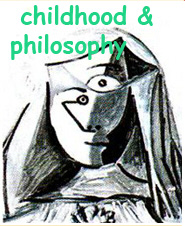questions and the community of philosophical inquiry
Abstract
Matthew Lipman wrote that “questioning is the leading edge of inquiry.” This reflects the primacy of the question in a community of philosophical inquiry. The heart of the transformative potential of philosophy for children is student engagement in a dialogue grounded in the questions that most appeal to the group and the collaborative attempt to construct meaning and cultivate deep understanding. The students’ responsibility for choosing the question to begin their discussion enhances the democratic nature of the community and highlights the preeminence within the inquiry of the issues that perplex the students. There is a significant relationship between having the children choose the question for discussion and the role of epistemological modesty – the acknowledgement that all members of the group, including the facilitator, are fallible and hold views that could end up being mistaken - in a community of philosophical inquiry. In order to encourage children to engage in what Lipman called “creative questioning,” it’s essential that we trust their judgment and support their cultivation of the inclination to question. Keywords: questioning and inquiry; community of philosophical inquiry; choice of question(s); epistemological modesty; authentic conversationDownloads
Download data is not yet available.
Downloads
Published
2011-06-26
Issue
Section
articles




